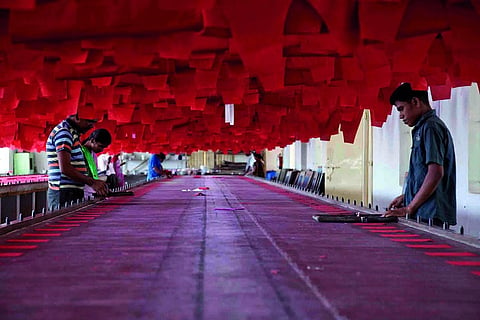

By Anuradha Nagaraj
A crime thriller about the death of an activist rescuing women from exploitative work conditions in garment and textile factories in southern India has become an unlikely bestseller among those campaigning for workers' rights.
The 300-page debut novel by a lawyer from Coimbatore, a district in Tamil Nadu state, is being used as a "manual" to understand forced labour in an industry that employs an estimated 45 million workers.
"The book is a page turner and each chapter unveils the history of exploitation in the spinning mills and factories," said Karrupu Samy, director of READ, a charity that works with garment workers in the Erode district of Tamil Nadu.
"It takes you to the root of the problem and we want workers and campaigners to read it so they understand the dynamics of this industry."
Much of India's $40 billion garment and textile industry operates informally and is poorly regulated.
Vulnerable workers, nearly three quarters of them women, have limited or no legal protection and few formal grievance mechanisms, campaigners say.
When lawyer Ira Murugavel sat down to write "Sempulam" (Desert Land), he thought of some of his clients - workers fighting for their wages.
His book, written in Tamil, opens with the police investigating the circumstances of the death of an activist near a spinning mill.
As the witnesses are called and suspects interviewed, each chapter of the book highlights the abuse workers face, the low wages and the long working hours spent weaving and stitching for global brands.
Murugavel grew up watching the growth of "exploitative" factories that dot Coimbatore, where he studied and now practices law.
"When you grow up in this region, you cannot ignore the industry. Everyone knows someone connected to the mills and everyone knows about the exploitation," Murugavel told the Thomson Reuters Foundation in a phone interview.
"I always wondered why girls went to work in these sweat shops."
Partly anecdotal, the book captures the change in the industry from being a "well-paying, lifelong" employment option to the "camp coolie system" of bonded labour.
"Mill managements have promised lump sum payment at the end of three years of employment, forcing young girls to work without the option of quitting," Murugavel said.
The book is being widely circulated in western Tamil Nadu, where Namakkal, Coimbatore, Tirupur, Karur, Erode and Salem districts are referred to as the "Textile Valley of India".
"We are recommending the book to both volunteers and workers," Samy said.
"Many working in this industry today don't understand the genesis of the exploitation. If they do, they will find a way out."
(Reporting by Anuradha Nagaraj, Editing by Jared Ferrie. This piece was originally published on March 8, 2018 in Thomson Reuters Foundation, the charitable arm of Thomson Reuters, that covers humanitarian news, women's rights, trafficking and climate change. Visit www.trust.org)